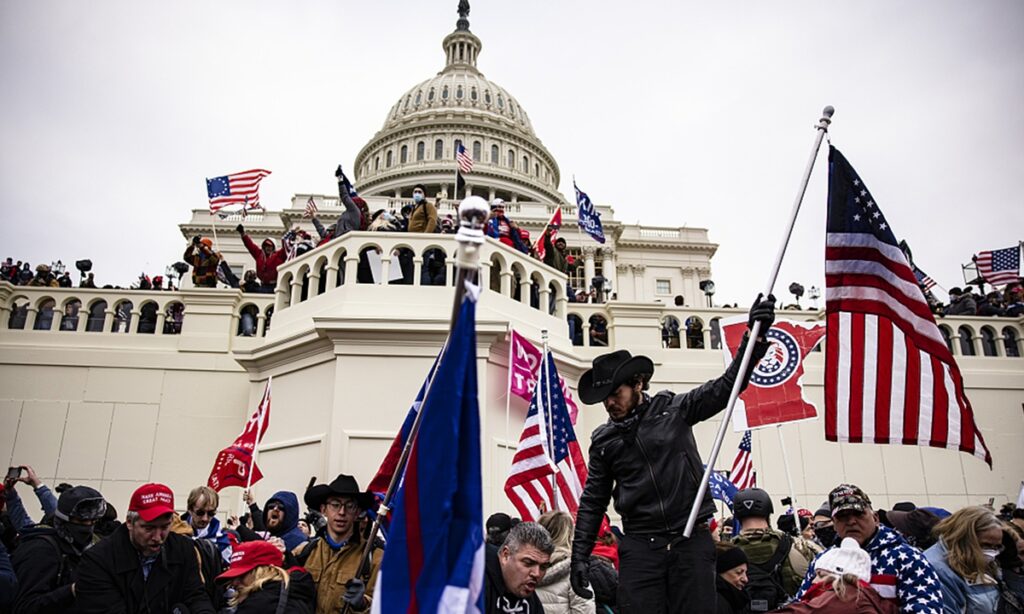As the FBI’s recent raid on former US President Donald Trump’s Mar-a-Lago estate in Florida continues to hit the headlines, more extremist sentiments have been observed in US society.
Former US intelligence official Phil Mudd said on Sunday in an interview with CNN that the consequences of this event resembled the Capitol riot that occurred on January 6, 2021. He even predicted that another “catastrophic event” could happen in the country, adding that today’s US domestic extremists were similar to the overseas ones he monitored.
The “free and democratic” soil of the US has been breeding more poisonous violence and extremism in recent years. FBI Director Christopher Wray once testified that the number of domestic terrorism cases has “exploded” since the spring of 2020. Homeland Security Secretary Alejandro Mayorkas has also called domestic violent extremism the “single greatest terrorism-related threat” in the US.
Clearly, extremists at home are now a more significant threat to the security of US society than those abroad. Lü Xiang, a research fellow at the Chinese Academy of Social Sciences, told the Global Times that the surge of US domestic extremists fundamentally reveals the matter of uneven wealth distribution in the country that is now increasingly divided between regions and classes.
“Americans have always anchored their hopes for a better change on the country’s democratic electoral system, but the system’s flaws have failed to improve their lives. This can lead some of these people to be hostile to the system as a whole,” he explained.
At the same time, Americans have the freedom to possess guns and easy access to firearms due to “too much freedom” in the US. Such a violent gene has certainly provided a material basis for increasing US domestic extremist activities.
The effect of growing US political polarization should also not be ignored. Democratic and Republican parties have completely polarized their political ideas, engaging in a religious-like “purge of dissidents.” This, in turn, catalyzes the growth and spreading of domestic extremism, which eventually leads to an irreversible black hole in US society.
When talking about extremist groups in the US, people would usually imagine the far-right ones, including Proud Boys and the Base, both designated as terrorist organizations by New Zealand in June.
However, far-left extremist groups have also been quite active in the past years in response to the rise of the far right. Trump proposed to designate the far-left group Antifa as a terrorist organization in 2020. Some armed leftist groups, such as the John Brown Gun Club and Redneck Revolt, believe they must arm themselves for protection from the violent far right.
Lü believes the fallout of the FBI’s Mar-a-Lago raid won’t be as terrifying and severe as that of the Capitol riot as Mudd predicted. However, the possibility of violent extremist activities on a smaller scale is still at a relatively high level. For example, if Trump is proven innocent in the end, the left will feel upset, and some far-left groups are likely to stir up some trouble, the Chinese expert noted.
US domestic extremists could be a more terrible headache to the US government than overseas ones. Having experienced numerous violent attacks by foreign terrorists, the US has actually long been on high alert for those forces. But the domestic extremists are much more difficult to guard against.
Generally, the terms “terrorism” and “extremism” are associated with achieving political goals, but US domestic extremists, whether they are from the far left or right, so far haven’t proposed clear political objectives. These people may not necessarily be working toward a political goal, but may simply be venting their discontent and anger. Therefore, extremist activities in the US could occur sporadically and randomly because of the absence of more specific goals, making them more challenging to monitor and control.
In Lü’s prediction, extremist activities targeted explicitly at certain US officials may increase significantly in the near future, even becoming a prominent social problem in the US. Be his or Mudd’s prediction correct or not, the US will surely suffer from more persistent pains of domestic extremism.
(Global Times)




